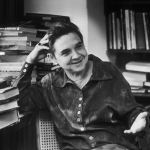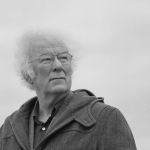I drew solitude over me, on the long shore.
—Robinson Jeffers, “Prelude”
For whoever does not afflict his soul through this day, shall be
cut off from his people.
—Leviticus 23:29
What is a Jew in solitude?
What would it mean not to feel lonely or afraid
far from your own or those you have called your own?
What is a woman in solitude: a queer woman or man?
In the empty street, on the empty beach, in the desert
what in this world as it is can solitude mean?
The glassy, concrete octagon suspended from the cliffs
with its electric gate, its perfected privacy
is not what I mean
the pick-up with a gun parked at a turn-out in Utah or the Golan Heights
is not what I mean
the poet’s tower facing the western ocean, acres of forest planted to the east, the woman reading in the cabin, her attack dog suddenly risen
is not what I mean
Three thousand miles from what I once called home
I open a book searching for some lines I remember
about flowers, something to bind me to this coast as lilacs in the dooryard once
bound me back there—yes, lupines on a burnt mountainside,
something that bloomed and faded and was written down
in the poet’s book, forever:
Opening the poet’s book
I find the hatred in the poet’s heart: . . . the hateful-eyed
and human-bodied are all about me: you that love multitude may have them
Robinson Jeffers, multitude
is the blur flung by distinct forms against these landward valleys
and the farms that run down to the sea; the lupines
are multitude, and the torched poppies, the grey Pacific unrolling its scrolls of surf,
and the separate persons, stooped
over sewing machines in denim dust, bent under the shattering skies of harvest
who sleep by shifts in never-empty beds have their various dreams
Hands that pick, pack, steam, stitch, strip, stuff, shell, scrape, scour, belong to a brain like no other
Must I argue the love of multitude in the blur or defend
a solitude of barbed-wire and searchlights, the survivalist’s final solution, have I a choice?
To wander far from your own or those you have called your own
to hear strangeness calling you from far away
and walk in that direction, long and far, not calculating risk
to go to meet the Stranger without fear or weapon, protection nowhere on your mind
(the Jew on the icy, rutted road on Christmas Eve prays for another Jew
the woman in the ungainly twisting shadows of the street: Make those be a woman’s footsteps; as if she could believe in a woman’s god)
Find someone like yourself. Find others.
Agree you will never desert each other.
Understand that any rift among you
means power to those who want to do you in.
Close to the center, safety; toward the edges, danger.
But I have a nightmare to tell: I am trying to say
that to be with my people is my dearest wish
but that I also love strangers
that I crave separateness
I hear myself stuttering these words
to my worst friends and my best enemies
who watch for my mistakes in grammar
my mistakes in love.
This is the day of atonement; but do my people forgive me?
If a cloud knew loneliness and fear, I would be that cloud.
To love the Stranger, to love solitude—am I writing merely about privilege
about drifting from the center, drawn to edges,
a privilege we can’t afford in the world that is,
who are hated as being of our kind: faggot kicked into the icy river, woman dragged from her stalled car
into the mist-struck mountains, used and hacked to death
young scholar shot at the university gates on a summer evening walk, his prizes and studies nothing, nothing availing his Blackness
Jew deluded that she’s escaped the tribe, the laws of her exclusion, the men too holy to touch her hand; Jew who has turned her back
on midrash and mitzvah (yet wears the chai on a thong between her breasts) hiking alone
found with a swastika carved in her back at the foot of the cliffs (did she die as queer or as Jew?)
Solitude, O taboo, endangered species
on the mist-struck spur of the mountain, I want a gun to defend you
In the desert, on the deserted street, I want what I can’t have:
your elder sister, Justice, her great peasant’s hand outspread
her eye, half-hooded, sharp and true
And I ask myself, have I thrown courage away?
have I traded off something I don’t name?
To what extreme will I go to meet the extremist?
What will I do to defend my want or anyone’s want to search for her spirit-vision
far from the protection of those she has called her own?
Will I find O solitude
your plumes, your breasts, your hair
against my face, as in childhood, your voice like the mockingbird’s
singing Yes, you are loved, why else this song?
in the old places, anywhere?
What is a Jew in solitude?
What is a woman in solitude, a queer woman or man?
When the winter flood-tides wrench the tower from the rock, crumble the prophet’s headland, and the farms slide into the sea
when leviathan is endangered and Jonah becomes revenger
when center and edges are crushed together, the extremities crushed together on which the world was founded
when our souls crash together, Arab and Jew, howling our loneliness within the tribes
when the refugee child and the exile’s child re-open the blasted and forbidden city
when we who refuse to be women and men as women and men are chartered, tell our stories of solitude spent in multitude
in that world as it may be, newborn and haunted, what will solitude mean?
1984-1985


Comment form: